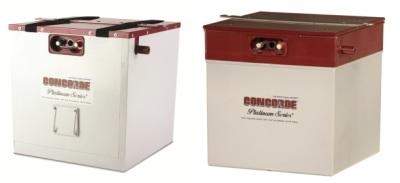Mon, Jul 23, 2012
Authorizes Replacement Of Nickel-Cadmium Or Lead-Acid Batteries
Concorde announced on the opening day of Oshkosh that its RG-380E/60L has been selected as the Original Equipment battery for Viking Air Limited new production DHC-6-400 aircraft. Concorde is also pleased to announce FAA approval of STC SA03971AT to replace nickel-cadmium main and auxiliary batteries on DHC-6-1, DHC-6-100, DHC-6-200, and DHC-6-300 vintage aircraft.

The STC provides for the replacement of the heavy duty main 40Ah nickel-cadmium or AN-3150 lead-acid battery and/or the nickel-cadmium auxiliary battery. The main battery can be replaced with either of Concorde’s popular RG-380E/44 (42Ah) or higher capacity RG-380E/60L (48Ah) battery for cold weather operations. If the aircraft has not been modified for removal of the auxiliary battery, the original nickel-cadmium auxiliary battery can be replaced with the new RG-300 (3.3Ah).
RG-380E/44, RG-380E/60L and RG-300 are all TSO authorized and as such, have passed rigorous TSO C-173 testing for duty cycle, electrical performance, temperature extremes, shock/vibration and environmental requirements. Concorde’s valve regulated lead acid (VRLA) recombinant gas (RG) absorbed glass mat (AGM) technology has been proven as reliable, durable and safe for over 30 years. Superior performance can be attributed to unique design features such as proprietary PolyGuard separators (an additional layer of protection against shorting, unique to Concorde) robust plate construction, over the cell wall intercell connections for reduced internal resistance and a commitment to quality standards.
The advantages of converting from nickel-cadmium to Concorde’s RG Series batteries include lower cost of acquisition, zero maintenance and reduced battery costs per flight hour. Concorde batteries do not require deep cycling to remove the “memory effects” seen in nickel-cadmium batteries, do not require water or electrolyte replenishment and have no risk of thermal runaway. With the benefit of RG® Series batteries shipping Hazmat Exempt, transportation is more cost effective regardless of whether shipping by land, sea or air.
More News
Aero Linx: Aviators Code Initiative (ACI) Innovative tools advancing aviation safety and offering a vision of excellence for aviators. The ACI materials are for use by aviation pra>[...]
Make Sure You NEVER Miss A New Story From Aero-News Network Do you ever feel like you never see posts from a certain person or page on Facebook or Instagram? Here’s how you c>[...]
From 2016 (YouTube Edition): Who You Gonna Call When You Have a Rocket Engine that Needs a Spacecraft? While at EAA AirVenture 2016, ANN CEO and Editor-In-Chief, Jim Campbell, sat >[...]
"In my opinion, if this isn't an excessive fine, I don't know what is... The odds are good that we're gonna be seeking review in the United States Supreme Court. So we gotta muster>[...]
Expedite Used by ATC when prompt compliance is required to avoid the development of an imminent situation. Expedite climb/descent normally indicates to a pilot that the approximate>[...]
 ANN's Daily Aero-Linx (04.30.25)
ANN's Daily Aero-Linx (04.30.25) ANN FAQ: Turn On Post Notifications
ANN FAQ: Turn On Post Notifications Classic Aero-TV: Agile Aeros Jeff Greason--Disruptive Aerospace Innovations
Classic Aero-TV: Agile Aeros Jeff Greason--Disruptive Aerospace Innovations Aero-News: Quote of the Day (04.30.25)
Aero-News: Quote of the Day (04.30.25) ANN's Daily Aero-Term (04.30.25): Expedite
ANN's Daily Aero-Term (04.30.25): Expedite



